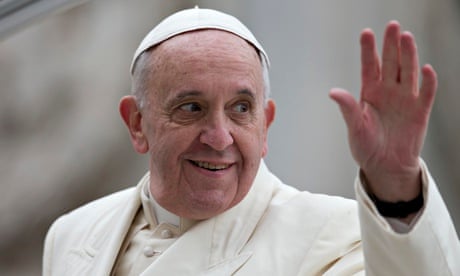Most Catholics disagree with what the church teaches them about contraception, divorce and abortion, according to a survey that reinforces the gap between the Vatican and its global flock before an extraordinary synod this year that many hope will lead to reform.
As part of a poll commissioned by the US Spanish-language network Univision, more than 12,000 Catholics in 12 countries were asked their opinions on the church's positions on issues such as gay marriage and women's ordination.
The survey found (pdf) that, of all the subjects covered, the church's teaching on contraception was most out of step with the thinking of ordinary Catholics, with 78% of respondents worldwide supporting the use of artificial birth control.
More than half (58%) disagreed with the church's stance that divorcees who remarry are ineligible for Communion. And 65% of the respondents said abortion should be allowed – 8% in all cases and 57% in some.
Beyond those findings, the picture presented by the poll – published on Sunday in the Washington Post, La Repubblica and El País – was of deep geographic divisions among the world's 1.2 billion Catholics.
Respondents in the two African countries polled – Uganda and the Democratic Republic of the Congo – gave answers that were consistently closer to church teachings. Support for contraception there, while still significant at more than 40%, was less than half that recorded in some European and most Latin American nations, where it topped 90%.
Three-quarters of African Catholics polled said they agreed with the church's treatment of divorcees. In Uganda, 64% of respondents were supportive of its wholesale rejection of abortion. In France, on the other hand, 94% of those polled said they thought women should be allowed to terminate pregnancies in some or all cases.
There was a similar divide over the thorny question of women's ordination, with a majority of European and US Catholics surveyed disagreeing with the church's ban on women priests, and a strong majority agreeing with it in Uganda, the DRC, Mexico and the Philippines. Responses on whether priests should be able to marry revealed divisions along the same lines.
On the subject of gay marriage, Catholics were more aligned both with each other and with church teaching. Two-thirds (66%) of respondents opposed it, though the levels of resistance varied from 99% in Uganda to 27% in Spain – by far the lowest recorded. Additionally, in all countries except Spain a majority of those polled said they did not think the church should perform marriages between two people of the same sex.
The Vatican is aware of a gulf between teachings and common practice on social issues. Last year it issued its own worldwide survey to try to gauge the attitudes of ordinary believers on subjects such as divorce, contraception and gay marriage, and last week bishops in Germany said its results showed that most Catholics in their country disagreed with the church's stance on artificial birth control, premarital sex, homosexuality and communion for remarried divorcees.
Pope Francis has called bishops to Rome in October for an extraordinary synod, only the third in history, to discuss how the church should respond "in the context of the pastoral challenges facing the family today". While expressing his firm opposition to women's ordination, gay marriage and abortion, the Argentinian pontiff has also said the church needs to be less obsessed with doctrine and more focused on pastoral care if it is to hold on to its existing members and reach new ones.

Comments (…)
Sign in or create your Guardian account to join the discussion